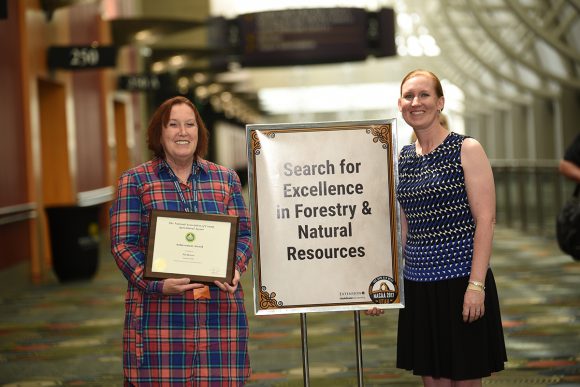
NACAA award winners environmental and resource management agents Pat Rector (L) and Amy Rowe
The National Association of County Agricultural Agents (NACAA) is the professional organization for Extension educators and other professionals who work in agriculture, horticulture, forestry and natural resources, 4-H youth development, community development, administration, aquaculture and Sea Grant, and related disciplines. Each year, NACAA recognizes members for outstanding work programs, communications, and service through its awards program.
At the 102nd Annual Meeting and Professional Improvement Conference of the National Association of County Agricultural Agents (NACAA) held in July in Salt Lake City, Utah, a number of agricultural agents and staff members from Rutgers NJAES Cooperative Extension were recognized for their work, both as national and regional winners for the northeast.
Featured below are several of the Rutgers award winners from the 2017 conference (excerpted from The County Agent newsletter of the NACAA, October 2017 issue).
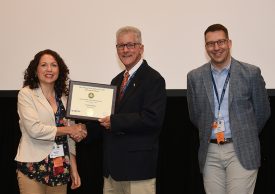
L to R – Michele Bakacs, (award recipient); Gene McAvoy Committee Vice-Chair; Steven Yergeau, Committee Vice-Chair
National Award Winner: 1st Place–Extension Education
Composting Gone Wild: Teaching School and Community Gardeners Proper Composting. Bakacs, Michele–County Agent II; Flahive DiNardo, Madeline–County Agent II; Szkotak, Becki–Program Associate II, Agriculture; Larson, Diane–Horticulturalist; Melendez, Meredith–County Agent III
Community and school gardens often have small composting systems to process food scraps and garden waste. Although gardeners understand the benefits of compost, managing the compost pile is often an afterthought. Challenges such as lack of a carbon-rich material, inappropriate setups for garden situations, or little to no maintenance often inhibits success. Rutgers Cooperative Extension has been working with school and community gardeners to teach proper composting techniques for greater success. This effort is part of a state-wide curriculum for Rutgers Master Gardeners which also includes food safety, pest management, and getting gardens started. Scripted and online audio presentations, and fact sheets have been produced. From 2015- 2016 close to 200 school/community gardeners, and Rutgers Master Gardeners attended a composting presentation which focused on how to successfully compost with large groups. The emphasis was on managing the end of season garden dump when plants are pulled from their beds and dumped in the compost, in addition to understanding carbon to nitrogen ratios, and having a compost point person who manages the pile. Pre- and post-tests showed an increase in knowledge in important concepts such moisture and aeration, “green” and “brown” materials, and troubleshooting composting problems. Future efforts include a new website and monitoring composting efforts to determine whether gardeners put into practice the techniques they learned.
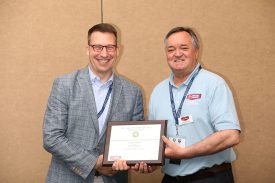
L to R – Steven Yergeau (award recipient) receiving award from National Sponsor Bayer Advanced representative Lance Walheim
National Winner: Computer Generated Graphics Presentation
Yergeau, Steven–County Agent III
Compaction is a major problem affecting soil health in agriculture and horticulture in Ocean County. Compacted soils inhibit the growth of plant roots affecting the health of crops, pastures, and landscape vegetation. This presentation was given to Rutgers Master Gardeners (RMGs) of Ocean County during two workshops in the spring of 2016. The objective of this presentation is to outline the causes of compaction, its effects on soil health, mitigation options, and how to measure soil compaction in the home landscape. The purpose of the lecture is to introduce the RMGs of Ocean County to compaction as a horticultural problem, how to diagnose potential soil compaction in the home landscape, and to discuss some methods to mitigate compaction. Audience members were instructed on the use of a soil compaction tester that was available for RMGs of Ocean County to borrow on a voluntary basis at home, and to report their findings back to Yergeau. This lecture was presented during two workshops in 2016 to 74 participants. Of the 74 Rutgers Master Gardeners trained, 43 signed up and tested their home lawns. The information gathered from the lawn testing effort is being used to develop a baseline level of soil compaction in Ocean County and management recommendations for homeowners. The information presented during the workshop was condensed and used to create a webpage titled “Understanding Soil Compaction” (http:// ocean.njaes.rutgers.edu/UnderstandingSoilCompaction. html). This lecture was fully developed as a scripted Microsoft PowerPoint presentation by Yergeau.
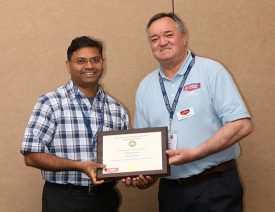
L to R – Hemant Gohil (award recipient) receiving award from Lance Walheim
National Winner: Fact Sheet
Gohil, Hemant–County Agent III
Red leaves in the vineyard are caused by many biotic (viruses, bacteria, and fungus) and abiotic (nutrient deficiencies, cold injury, damage to root systems, etc.) stresses. Anything that can cause blockage or stress in the vascular system where water and nutrients are transported can result in the development of red leaves. Though the timing, pattern of appearance, and spread could be different, the overlapping of the symptoms, especially the reddening of leaves, makes it very difficult to identify the cause based only on visual symptoms. The fact sheet “Red Leaves in The Vineyard: Biotic and Abiotic Causes” was developed to educate beginning and established wine grape growers on how to differentiate the symptoms between nutritional deficiencies and virus diseases. It also advises wine grape growers not to rely on guesswork, but to get the vines tested for accurate diagnosis as soon as possible. Examples of abiotic and biotic stresses with pictures, description and remedy are presented along with a decision making chart for action to be taken after appearance of the red leaves on grapevines. The fact sheet content was presented at the Wine Grape session of 2017 Mid-Atlantic Fruit and Vegetable Convention in Hershey, PA where the entrant was an invited speaker. The fact sheet was distributed to growers at that convention (55) and at wine grape twilight meetings (32). The fact sheet (FS1260) is published at Rutgers New Jersey Agriculture Experiment Station. https://njaes.rutgers. edu/pubs/fs1260.
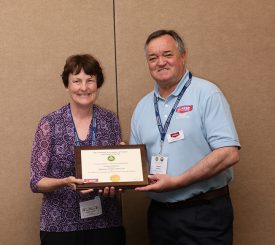
L to R – Madeline Flahive DiNardo (award recipient) receiving award from Lance Walheim
National Winner: Learning Module
Flahive DiNardo, Madeline–County Agent II; Bakacs, Michele–County Agent II; Melendez, Meredith–County Agent III; Nitzsche, Peter–County Agent II; Larson, Diane–Horticulturalist; Szkotak, Rebecca–Master Gardener Coordinator; Magron, Rebecca–Program Associate II; Infante Casella, M.–County Agent II
A team of Rutgers Cooperative Extension County Agents and Master Gardener Program Coordinators joined forces to create a community vegetable gardening curriculum that could be used by volunteer Master Gardeners, schools and community gardening organizations to teach gardeners the basics of establishing and maintaining a vegetable garden. Our objectives were to: 1) create peer-reviewed presentations, 2) develop program evaluations that could be easily administered and have Institutional Review Board (IRB) approval, 3) train volunteer Master Gardeners to deliver the curriculum and 4) facilitate Master Gardeners delivering the curriculum in their local communities. The team identified five topics the curriculum should address and established learning objectives for each one: Starting a Community Garden, Composting, Harvesting & Food Safety and Insect & Disease Management, Part 1 Integrated Pest Management Techniques, Part 2 Key Plants – Key Pests. Each presentation was reviewed by the department chair and faculty with expertise in the topic. The curriculum consists of scripted and audio PowerPoint™ presentations. The presentations were recorded using PowerPoint™ and converted to MP4 files. Each presentation is accompanied with Rutgers Cooperative Extension and USDA fact sheet resources and pre/post evaluation quizzes. Each pre/post quiz consists of 10 true/false/not sure statements. The evaluations have Rutgers IRB approval. They can be administered using paper and are also available as on-line Qualtrics surveys. The lead author, Flahive DiNardo, was responsible for coordinating team meetings, co-writing scripts, developing program evaluation materials, facilitating IRB and peer reviews, recording four presentations, final editing and the distribution of materials. In the Fall of 2016, 137 Master Gardeners attended regional training programs and received the curriculum on jump drives. The curriculum is also available to Master Gardener Coordinators on a Rutgers SAKAI course management website. Extension colleagues are welcome to have access to the curriculum materials upon request (contact: Flahive@ njaes.rutgers.edu). The presentations with accompanying resource materials and evaluation quizzes will be available to the general public on the NJ Agricultural Experiment Station website: www.njaes.rutgers.edu.
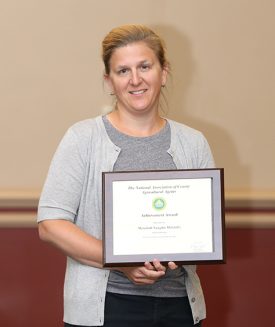
Meredith Melendez with NACAA award
National Winner: Search for Excellence in Farm Health and Safety
Meredith Melendez–County Agent III
The Rutgers On-Farm Food Safety Team: Melendez, Meredith – County Agent III; Kline, Wesley–County Agent II; Kleingunther, C.–Bureau Chief, New Jersey Department of Agriculture; Schaffner, Donald–Extension Specialist
The On-Farm Food Safety Team has trained over 6,000 individuals in the produce industry since 1999. This represents most New Jersey produce operations, including farms who grow for wholesale distribution, on-farm sales, direct market sales, new and beginning farmers, multi-generational farm families, and both organic and conventional producers. The team’s interaction with growers has raised the awareness of food safety from “it is not our problem” to one of the most important aspects in a produce operation. A minimum of eight one-day grower trainings on farm food safety are offered annually with additional single presentations offered at grower meetings throughout the state. Workshop participants are provided with hard copies of training materials as well as a USB drive with supplemental materials, sample record keeping forms and templates to write their own food safety plans. Additionally, the team offers walk-through visits with farms to give guidance on current and proposed foods safety practices at the farm. In 2016 over 30 farm walk-throughs were conducted. The team has developed over 40 slide show presentations, written training manuals and Extension fact sheets, produced articles for popular publications, distributes information through social media (Facebook and webinars), through the Rutgers Plant and Pest Advisory updates and the Rutgers Vegetable Online Resource Center website. Results of their Extension activities have been presented at the National Association County Agricultural Agents and American Society for Horticultural Science annual meetings and to various commodity groups. Team members serve on national educational committees for the Food Safety Modernization Act, including the On-Farm Readiness Review committee, the calibration committee for the FSMA Produce Rule curriculum development team and the Northeast Center to Advancement Food Safety. The team collaborates with the New Jersey Department of Agriculture, the National Association of State Departments of Agriculture and others. They have obtained over $300,000 in external grants.
2017 Achievement Award Winners: Northeast Region
New Jersey–Amy Rowe, County Agent II
In recognition of excellence in the field of professional Extension for members with less than 10 years of service.
As County Agent II/Associate Professor for Essex and Passaic Counties, Rowe has secured over $2,000,000 in funding to support her Extension programming since 2010. She has garnered national recognition for her Veterans Environmental Technology and Solutions (VETS) program and for her innovative environmental and community programming throughout the Passaic River watershed. She has demonstrated tremendous leadership in training and supervising staff, Extension volunteers, and planning a national conference hosted in the northeast.
Additional 2017 NACAA Award Winners
Polanin, Nicholas, County Agent II
Regional Winner, Program Promotional Piece
Polanin, Nicholas, County Agent II; Carleo, Jenny, County Agent II; Matthews, Jennifer, Program Associate I; Boninfante, Lenora, Public Relations Assistant; Brumfield, Robin, Extension Specialist; Gohil, Hemant, County Agent III; Govindasamy, Ramu, Extension Specialist; Heckman, Jeff, Media Specialist; Kluchinski, Dan, County Agent I; McGrady, Justin, Media Specialist; Melendez, Meredith, County Agent III; Nitzsche, Peter, County Agent II; Sutton, Andrew, Media Specialist; Wyenandt, C. Andrew, Extension Specialist
Yergeau, Steven, County Agent III
Regional Winner, Published Photo & Caption
Yergeau, Steven, County Agent III
National Finalist, Video Presentation
Bakacs, Michele, County Agent II; Smela, David, Public Information Assistant
National Finalist, Search for Excellence in Environmental Quality, Forestry and Natural Resources
Rector, Pat, County Agent II; Bakacs, Michele–County Agent II; Amy Rowe, County Agent II; Cook-Menzel, A., Communications Specialist, Atlantic County Utilities Authority

